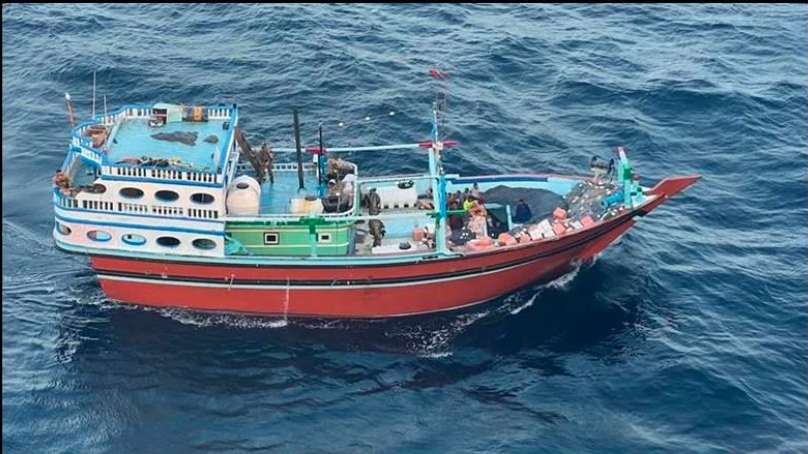
An image without a specified date, shared by the U.S. military's Central Command, displays a vessel carrying missile components of Iranian origin intended for Yemen's Houthi group in the Arabian Sea. On Tuesday, January 16, 2024, the U.S. military reported that Navy SEALs successfully confiscated Iranian-made missile parts and additional weapons from a ship destined for Yemen's Houthi rebels during a mission in which two commandos went missing. The information was provided by the U.S. Central Command via AP.
Washington, D.C. - A 10-day search operation to rescue two Navy SEALs lost in the Arabian Sea during a mission to intercept an unflagged ship carrying illicit Iranian-made weapons has concluded, with the U.S. military officially declaring the sailors deceased on Sunday.
U.S. Central Command, in a statement, announced the transition of the operation to a recovery effort, refraining from disclosing the identities of the SEALs as family notifications are still in progress.
Throughout the extensive search, spanning more than 21,000 square miles, ships and aircraft from the U.S., Japan, and Spain collaborated, aided by the Fleet Numerical Meteorology and Oceanography Centre, the U.S. Coast Guard Atlantic Area Command, University of San Diego - Scripts Institute of Oceanography, and the Office of Naval Research.
Gen. Erik Kurilla, head of U.S. Central Command, expressed condolences, stating, "We mourn the loss of our two Naval Special Warfare warriors, and we will forever honour their sacrifice and example. Our prayers are with the SEALs' families, friends, the U.S. Navy, and the entire Special Operations community during this time."
The ill-fated mission on January 11 targeted a ship transporting Iranian-made weapons to Houthi rebels in Yemen. During the operation, as the SEALs were boarding the vessel, one member succumbed to the heavy seas, prompting a valiant rescue attempt by a teammate.
Launching from the USS Lewis B. Puller, a mobile sea base, the commandos utilized small special operations combat craft supported by drones and helicopters to reach the targeted boat successfully. The raid resulted in the confiscation of various Iranian-made weaponry, including components for cruise and ballistic missiles, such as propulsion and guidance devices, warheads, and air defence parts.
In response to safety concerns, the U.S. Navy decided to sink the ship carrying the weapons, detaining its 14 crew members. This seizure marked the latest in a series of interdictions by the U.S. Navy and its allies, aiming to curb weapon shipments to Houthi rebels, who have posed threats to global trade routes in the Red Sea and Gulf of Aden amid escalating tensions over Israel's conflict with Hamas in the Gaza Strip.















